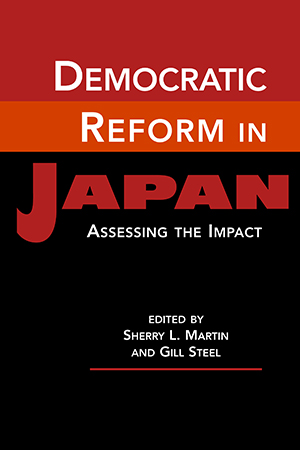
- 2008/253 pages
- A related title: Money Politics in Japan: New Rules, Old Practices by Matthew Carlson.
Democratic Reform in Japan:
Assessing the Impact
Hardcover: $68.50
ISBN: 978-1-58826-581-4
Widespread dissatisfaction in Japan in the 1990s set the stage for numerous political reforms aimed at enhancing representation and accountability. But have these reforms in fact improved the quality of Japanese democracy? Through the lens of this question, the authors explore contemporary Japanese politics at the national, local, and grassroots levels. Their systematic analysis of when and how citizens attempt to create and use new opportunities to articulate political interests offers insights not only on the current state of Japanese democracy, but also on the dynamics of political behavior over all.







